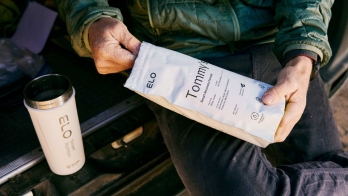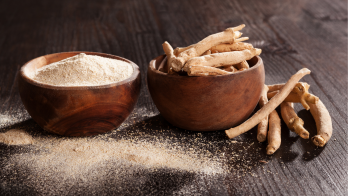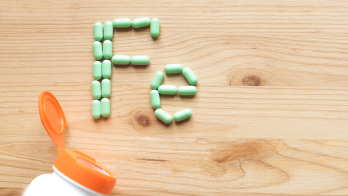What you need to know about nutrition for long COVID
Struggling with post-COVID-19 syndrome? Experts say diet and nutrition may help. Here’s what you need to know about nutrition for long COVID.
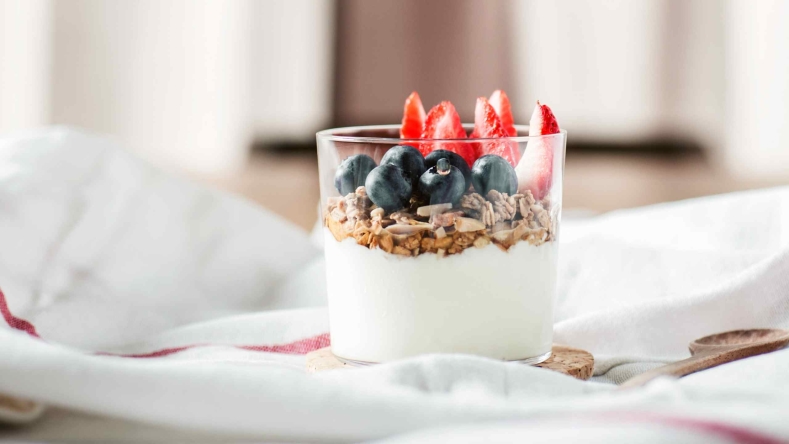
Most people with COVID-19 feel better within a few days or weeks. But for some, symptoms can last longer and have debilitating effects. Based on data from the U.S. Center for Disease Control Prevention, roughly 7.5% of adults with COVID-19 will experience long COVID, or otherwise known as post-COVID-19 syndrome [ 1
If you, a family member, or a friend are dealing with long COVID symptoms, early research shows a few nutrition tweaks may support your recovery.
Before we dive into how you can optimize your nutrition for long COVID, let’s first take a look at what long COVID is, some of the common symptoms, and who is most susceptible.
What is long COVID?
Long COVID, or post-COVID-19 syndrome, is generally defined as the persistence of symptoms that develop during or following a COVID-19 infection that lasts more than 12 weeks and is not explained by an alternative condition or diagnosis [ 2
While those who have been hospitalized are more susceptible, individuals with mild cases can also experience these symptoms for extended periods of time as well [ 3
Long COVID symptoms
People with long COVID can have a wide range of symptoms that can last weeks, months, or even years after infection and can even return after they’ve gone away. Symptoms may also be difficult to manage and not well explained by tests. [ 4
Common symptoms of post-COVID-19 syndrome include [ 2 4
Fatigue
Fever
Sleep disturbances
Trouble breathing or shortness of breath
Changes in smell or taste
Joint pains
Anxiety
Low mood
Dizziness
Difficulty concentrating or thinking (brain fog)
Cognitive dysfunction
Chest pain
Diarrhea
Stomach pains
Heart palpitations (pounding heart)
Pins and needles
Hair loss
Blood clots
Chronic kidney disease
Joint or muscle pain
Rash
Menstrual cycle changes
4 ways to optimize your nutrition for post covid syndrome
Growing evidence shows nutrition may play a key role in the management of post-COVID-19 syndrome and aid in long COVID recovery [ 2
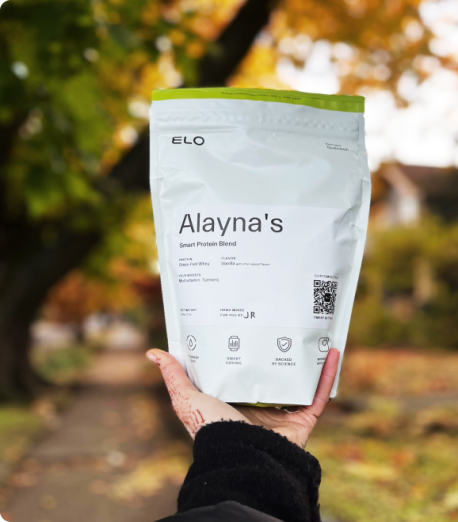
1. Up your protein intake.
Not only does COVID-19 wreak havoc on your respiratory system, but research shows it also causes severe muscle protein breakdown, which can result in the loss of lean muscle mass. For individuals with long COVID, the breakdown of muscle protein can have significant detrimental effects on body composition, muscle function, and quality of life, particularly in older individuals [ 2 5
Given this, nutritional therapy to restore muscle mass has become a key aspect of the management of post-COVID-19 syndrome [ 2
According to the RDA, the average healthy individual needs around 0.8 g/kg of body weight per day to maintain nitrogen balance and prevent muscle loss [ 6 7 8
To build muscle
If you’re having a hard time meeting your protein goals from food alone, protein supplementation can help. Protein powders, like Elo Smart Protein
If you’re feeling up for it, talk to your doctor about incorporating some light strength training into your routine as well. Research shows when paired with resistance training, protein supplementation can be incredibly effective for increasing muscle mass and strength [ 2
Learn more about how
Elo Smart Protein
can help you meet your protein and health goalshere
.
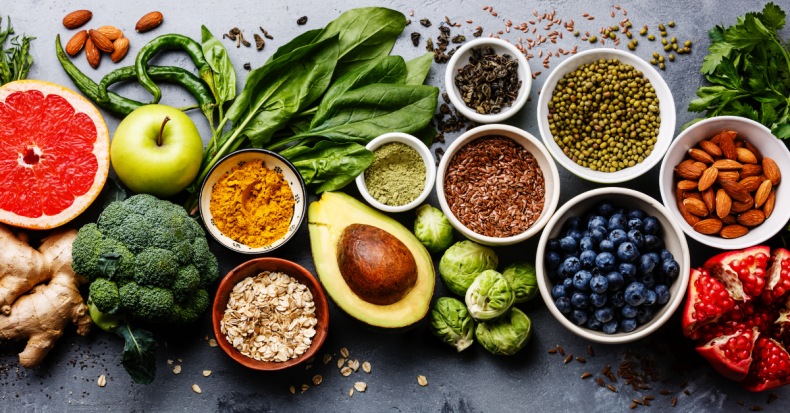
2. Follow a Mediterranean diet.
Inflammation plays a significant role in acute COVID-19 infections and their severity, and early research shows it also plays a role in long COVID as well [ 9
Because the foods we eat can modulate both inflammation and the immune system, your diet can impact your recovery from COVID-19. Thus far, research shows a convincing association between adherence to the Mediterranean diet 2
Given this, experts are recommending individuals experiencing long COVID follow a Mediterranean-style diet consisting heavily of plant-based foods (fruits, vegetables, whole grains, and legumes), high-quality animal proteins (omega-3 rich fish, lean meat, poultry, and eggs), and extra-virgin olive oil as a principal source of fat [ 2
In addition to prioritizing these foods, it’s important to stay well hydrated, so make sure you’re drinking 2.5-3 liters of fluid per day.
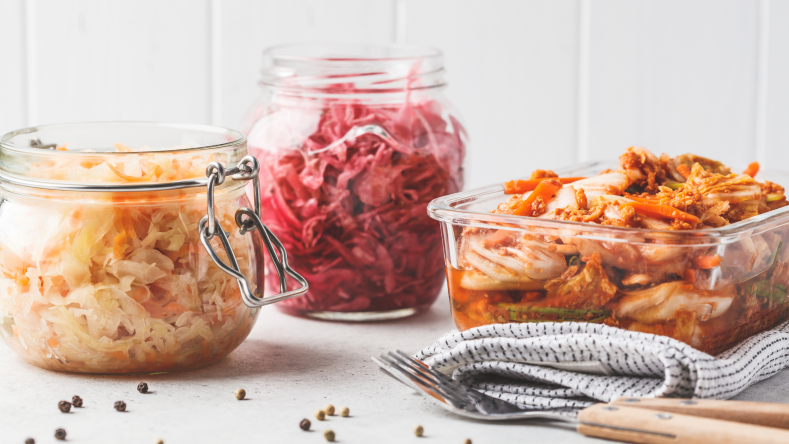
3. Boost your good gut bacteria.
In addition to triggering massive inflammation, COVID-19 can also wreak havoc on your microbiome
Research shows the presence and diversity of beneficial microorganisms in the gut may play an important role in determining the course of this disease, including the occurrence and severity of long COVID [ 10
If you have long COVID, prioritizing foods that support a healthy microbiome may boost your recovery and support your overall physical and psychological well-being [ 2
Yogurt
Kefir
Kimchi
Kombucha
Sauerkraut
Miso
Pickles
Some cheeses, including Swiss, Gouda, Gruyere, provolone, and cheddar
Raw, unfiltered apple cider vinegar
In addition to these foods, you may also want to consider taking a probiotic supplement. Many probiotics, including Lactobacillus and Bifidobacteria, have been shown to improve or alleviate lung disease conditions and might also improve the immune response [ 2 10
To learn more about probiotics and which strains might be right for you, check out Elo’s guide to the benefits of probiotics
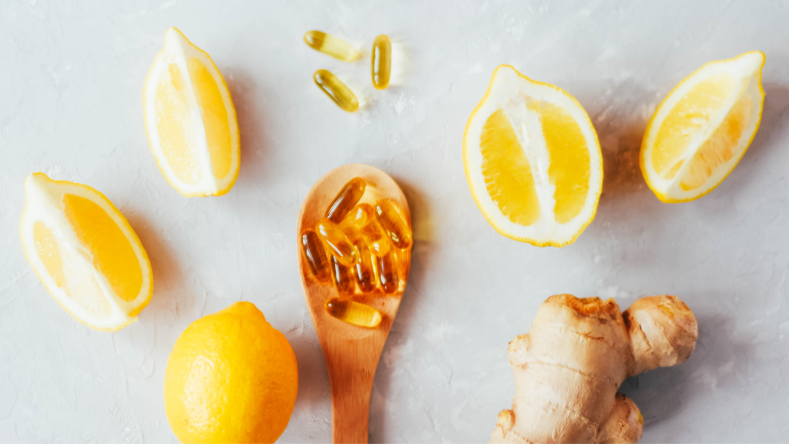
4. Consider post COVID nutritional supplements
If you’re struggling with post-COVID-19 syndrome, research shows that certain supplements may help reduce inflammation, induce healthy changes in the gut microbiome, and improve immune response [ 2
Vitamin D
Vitamin D
Given the prevalence of vitamin D deficiency (90% of Elo members start with low levels) and its fundamental role in immune function, experts consider it a safe and inexpensive supplement to include as part of COVID-19 treatment [ 11
The Recommended Dietary Allowance (RDA) for people between the ages of 1 and 70 is 600 IU/day, and for adults over 70, the RDA is 800 IU/day [ 12
If you choose to supplement, a daily dose of 1,000–2,000 IU of vitamin D3 is sufficient to meet most people’s needs, with the safe upper limit set at 4,000 IU/day [ 12 13
If you don’t know your vitamin D level or are confused about how much vitamin D you should take, there’s no need to worry. At Elo Health, we take the guesswork out of the equation by overlaying your blood biomarker results, wearable data, and questionnaire answers to recommend the right nutrition and supplements for you. Elo’s formulary includes over 60 nutrients (including vitamin D), all of which undergo rigorous third-party testing. Try
Elo Smart Supplements
out for yourself today.
Omega-3s
Omega-3s 2
To improve inflammation, experts recommend those with post-COVID syndrome aim to get 1.5–3 g/day of omega-3 fatty acids (specifically EPA and DHA). Moreover, the consumption of extra-virgin olive oil should be increased to provide an adequate intake of monounsaturated fatty acids, tocopherols, and polyphenols, which have demonstrated anti-inflammatory and antioxidant properties [ 2
Prebiotics
Similar to probiotics, prebiotics 14
Studies also show prebiotics like wheat bran, fructooligosaccharide (FOS), and galactooligosaccharide (GOS) can be beneficial for reducing inflammation in some respiratory diseases [ 10
Given this, many experts recommend the concurrent use of prebiotics and probiotics for the treatment of COVID-19 infection [ 14
Whole grains, fruit, vegetables, and legumes are great food sources of prebiotics; however, prebiotic supplements are available and may provide additional benefits for those all-important gut microbes.
Polyphenols
Polyphenols are plant compounds with various health benefits that may be beneficial for recovery from post-COVID syndrome [ 2
Polyphenols like quercetin, resveratrol, and catechins have potent antiviral, anti-inflammatory, and antioxidant properties. Similar to probiotics, they have also been shown to induce healthy changes in the gut microbiome [ 2
Berries, dark chocolate, red wine, red cabbage, whole grains, green tea, and turmeric are some of the best-known food sources of polyphenols. Studies also show that polyphenol-containing supplements (like green tea extract 2
More immune-boosting articles you may like:
The best supplements to boost immunity
(that are not vitamin C)
Summary
Roughly 7.5% of adults recovering from COVID will experience long COVID. The symptoms (which can include fatigue, sleep disturbances, difficulty breathing, increased anxiety, depressed mood, brain fog, and digestive upset) can vary in severity and persist for months or even years after the initial infection. To boost your recovery from post-COVID-19 syndrome, health experts recommend following a Mediterranean diet with plenty of high-quality protein and probiotics. Certain supplements, such as vitamin D, omega-3s, prebiotics, and polyphenols, may provide additional benefits for long COVID recovery.
Learn more about how Elo Health personalized protein smart supplements
Disclaimer: The text, images, videos, and other media on this page are provided for informational purposes only and are not intended to treat, diagnose, or replace personalized medical care.
Key takeaways
Evidence shows nutrition may play a key role in the management of post-COVID-19 syndrome and aid in long COVID recovery.
Protein intakes of 1-1.5 g/kg/day can help offset muscle breakdown caused by COVID-19 infection and promote muscle building in those with long COVID [
2
].A Mediterranean diet consisting heavily of plant-based foods, high-quality animal proteins, and extra-virgin olive oil as a principal source of fat will provide antioxidant and anti-inflammatory benefits that may also improve recovery from long COVID.
Vitamin D, omega-3s, prebiotics, and polyphenols, may further improve immune response, reduce inflammation, and induce healthy changes in the gut microbiome that support recovery from post-COVID syndrome.
If you or someone you know are experiencing post-COVID-19 syndrome and want to optimize your nutrition and supplements to aid recovery,
Elo Health
can help.
References
O’Mahoney, L., Routen, A., Gillies, C. L., Ekezie, W., Welford, A., Zhang, A. X., Karamchandani, U., Simms-Williams, N., Cassambai, S., Ardavani, A., Wilkinson, T. J., Hawthorne, G., Curtis, F., Kingsnorth, A. P., Almaqhawi, A., Ward, T., Ayoubkhani, D., Banerjee, A., Calvert, M., . . . Khunti, K. (2023). The prevalence and long-term health effects of Long Covid among hospitalised and non-hospitalised populations: a systematic review and meta-analysis. EClinicalMedicine, 55, 101762.
https://doi.org/10.1016/j.eclinm.2022.101762
Barrea, L., Grant, W. B., Frias-Toral, E., Vetrani, C., Verde, L., de Alteriis, G., Docimo, A., Savastano, S., Colao, A., & Muscogiuri, G. (2022). Dietary Recommendations for Post-COVID-19 Syndrome. Nutrients, 14(6), 1305.
https://doi.org/10.3390/nu14061305
Long COVID symptoms linked to inflammation. (2022, July 12). National Institutes of Health (NIH).
https://www.nih.gov/news-events/nih-research-matters/long-covid-symptoms-linked-inflammation
Post-COVID Conditions. (2022, December 16). Centers for Disease Control and Prevention.
https://www.cdc.gov/coronavirus/2019-ncov/long-term-effects/index.html
Montes-Ibarra, M., Oliveira, C. L. P., Orsso, C. E., Landi, F., Marzetti, E., & Prado, C. M. (2022). The Impact of Long COVID-19 on Muscle Health. Clinics in geriatric medicine, 38(3), 545–557.
https://doi.org/10.1016/j.cger.2022.03.004
National Academies Press (US). (1989). Protein and Amino Acids. Recommended Dietary Allowances - NCBI Bookshelf.
https://www.ncbi.nlm.nih.gov/books/NBK234922/
Paddon-Jones, D., & Rasmussen, B. B. (2009). Dietary protein recommendations and the prevention of sarcopenia. Current opinion in clinical nutrition and metabolic care, 12(1), 86–90.
https://doi.org/10.1097/MCO.0b013e32831cef8b
Yanai H. (2015). Nutrition for Sarcopenia. Journal of clinical medicine research, 7(12), 926–931.
https://doi.org/10.14740/jocmr2361w
Frere, J. J., Serafini, R. A., Pryce, K. D., Zazhytska, M., Oishi, K., Golynker, I., Panis, M., Zimering, J., Horiuchi, S., Hoagland, D. A., Møller, R., Ruiz, A., Kodra, A., Overdevest, J. B., Canoll, P., Borczuk, A. C., Chandar, V., Bram, Y., Schwartz, R. S., . . . tenOever, B. R. (2022). SARS-CoV-2 infection in hamsters and humans results in lasting and unique systemic perturbations after recovery. Science Translational Medicine, 14(664).
https://doi.org/10.1126/scitranslmed.abq3059
Dhar, D., & Mohanty, A. (2020). Gut microbiota and Covid-19- possible link and implications. Virus research, 285, 198018.
https://doi.org/10.1016/j.virusres.2020.198018
Barrea, L., Verde, L., Grant, W. B., Frias-Toral, E., Sarno, G., Vetrani, C., Ceriani, F., Garcia-Velasquez, E., Contreras-Briceño, J., Savastano, S., Colao, A., & Muscogiuri, G. (2022). Vitamin D: A Role Also in Long COVID-19?. Nutrients, 14(8), 1625.
https://doi.org/10.3390/nu14081625
Office of Dietary Supplements - Vitamin D. (2021, August 17). National Institutes of Health. Retrieved March 29, 2022, from
https://ods.od.nih.gov/factsheets/VitaminD-HealthProfessional/
Patel, K. (2022, March 28). Vitamin D. Examine.Com. Retrieved March 29, 2022, from
https://examine.com/supplements/vitamin-d/
Alenazy, M. F., Aljohar, H. I., Alruwaili, A. R., Daghestani, M. H., Alonazi, M. A., Labban, R. S., El-Ansary, A. K., & Balto, H. A. (2022). Gut Microbiota Dynamics in Relation to Long-COVID-19 Syndrome: Role of Probiotics to Combat Psychiatric Complications. Metabolites, 12(10), 912.
https://doi.org/10.3390/metabo12100912



